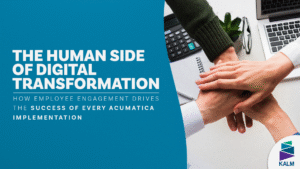The True Measure of ERP Success
Rescuing an ERP project doesn’t end when the system runs smoothly—it ends when the client truly owns it. The ultimate metric of success is not billable hours; it’s lasting autonomy.
From the beginning, the goal of every ERP team empowerment process is to build long-term capacity, not dependency. This final stage of our R.E.S.C.U.E. methodology is about transferring control—knowledge, tools, and confidence—to ensure that once the consultant steps away, the value remains and multiplies.
The Dependency Trap: When Fear Freezes Progress
Many companies enter a post-implementation silence rooted in fear. You can hear it whispered in hallways or over coffee:
- “If it works, don’t touch it.”
- “Let’s ask the consultant—just in case.”
- “Better wait until next month; we’re out of support hours.”
This is not sustainability—it’s operational captivity. It paralyzes agility, slows innovation, and prevents the ERP from evolving with the business.
ERP team empowerment is the antidote. It shifts ownership from external hands to your internal team. Instead of flying the project ourselves, we coach your people from the ground, building their confidence until they can navigate the system independently.
Our Commitment: Building System Owners, Not Just Users
At KALM Consulting, the Empower phase is more than a final training—it’s the ultimate act of responsibility. We create true system owners through a deliberate, structured plan.
🧠 From the “How” to the “Why”
We go beyond showing where to click. We explain the logic behind processes so teams can troubleshoot issues and design improvements—without relying on memorized instructions.
🛠 Living, Actionable Knowledge
We deliver a custom-built knowledge base:
- Visual workflows that map critical processes.
- Interactive FAQs for quick answers.
- Maintenance checklists to prevent downtime.
- Step-by-step tutorials designed for real-world use.
📈 Metrics That Track Maturity
We establish measurable indicators of autonomy—such as reduced reliance on external support, faster internal problem resolution, and fewer recurring errors.
🔁 A Habit of Continuous Improvement
We help create internal routines and committees so improvement becomes part of the culture. The team learns to identify opportunities and implement changes proactively.
🤝 Internal Knowledge Multipliers
We identify key users and mentor them into becoming internal champions who can train others, ensuring that skills spread across the organization.
Real-World Example: Turning Users into Leaders
A retail chain had a well-functioning ERP system but remained dependent on outside consultants for even basic changes. When a pricing update was needed, it took three days and two service tickets to complete.
During the ERP team empowerment phase, we:
- Trained in-house champions to handle configuration changes.
- Built a searchable knowledge base with process documentation.
- Established monthly “ERP review” meetings to track internal improvements.
Within six months, 85% of changes that previously required a consultant were handled internally—saving over $30,000 in external support costs annually.
Is Your Team Truly Owning Your ERP? Warning Signs of Dependency
If you see these symptoms, your ERP ownership is incomplete:
- Every unusual task requires an external ticket.
- Staff turnover causes chaos because knowledge isn’t documented.
- No one suggests improvements for fear of breaking something.
- The team stays reactive, constantly fixing urgent problems instead of innovating.
- System updates are viewed as threats instead of opportunities.
Practical Steps to Strengthen ERP Team Empowerment
- Document Everything – Create living documentation for all critical processes.
- Build Redundancy in Knowledge – Train multiple people for each key function.
- Encourage Safe Experimentation – Use sandbox environments for testing.
- Set Internal KPIs – Measure autonomy, not just system uptime.
- Celebrate Internal Wins – Publicly acknowledge when the team solves issues without outside help.
The Outcome: A Project That Runs on Its Own (and Grows)
When ERP team empowerment is complete:
- Knowledge resides in-house – Technical and functional expertise belongs to your team.
- Autonomy to solve and grow – Your people can evolve the ERP without waiting for external help.
- Ownership and agility – Improvements happen internally and align with business priorities.
A truly successful ERP project doesn’t just survive—it thrives under the leadership of the team that uses it every day.
Closing Thoughts: Empower Is the True Beginning
ERP team empowerment is not the end of our job—it’s the beginning of yours. This is when your team holds the knowledge, the control, and the confidence to adapt the system without limits.
When autonomy is in place, the ERP becomes more than software—it becomes a strategic asset, evolving in step with your company.
Ready to Take Ownership of Your ERP?
Book your free 30-minute consultation with an ERP Rescue Specialist from KALM Consulting.
We’ll help you transform your team from system users into true system owners who can master and grow with your ERP.








